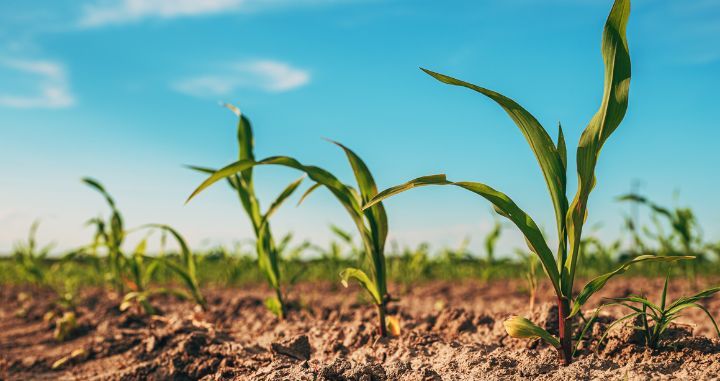Written by guest author Dr. Renata Nave Oakes, Associate Professor, Plant Sciences, University of Tennessee

Dr Renata Nave Oakes
Recently, I had the opportunity to join Gordon Merrick, Policy Program Director, Vinnie Trometter, Policy Fellow, and Rebecca Champagne, Conservation Scientist, at the Organic Farming Research Foundation, in a meeting with staff from Representative Burchett and Representative Ogles’ offices. I was proud to be able to share my perspective on how the Organic Transitions Program (ORG) supports my research of developing effective, science-based strategies for producing organic corn using living mulch systems in Tennessee and the Southeastern U.S.
Organic Corn Research in the Southeastern US
As an Associate Professor of Plant Sciences at the University of Tennessee, I am using the Organic Transitions Program to research how to improve soil health, reduce weed pressure, enhance nitrogen availability through biological fixation, and ultimately make organic corn production more profitable and practical for farmers in Tennessee and the Southeastern U.S. Organic corn is in high demand nationwide, especially for livestock feed, but domestic supply lags behind — forcing the U.S. to heavily rely on imports. This is especially true for the Southeastern U.S., where organic corn production is underdeveloped. Our research addresses the key barriers holding organic corn producers back: poor weed control, limited fertility options, and higher production costs.
 To do this, we use a combination of greenhouse trials and multi-location field experiments at certified organic research sites in Tennessee. We’re testing organic seed treatments, comparing legume living mulch species, and monitoring soil health, nutrient cycling, weed pressure, and corn yield. We also conduct full economic analyses, including cost of production, breakeven yield, and net returns. We also work closely with the Tennessee Corn Promotion Board and local organic and transitioning-to-organic farmers, who help guide our work and provide field-level insight. The work is spearheaded through our multi-disciplinary team at the University of Tennessee, including agronomists, soil scientists, economists, and plant pathologists.
To do this, we use a combination of greenhouse trials and multi-location field experiments at certified organic research sites in Tennessee. We’re testing organic seed treatments, comparing legume living mulch species, and monitoring soil health, nutrient cycling, weed pressure, and corn yield. We also conduct full economic analyses, including cost of production, breakeven yield, and net returns. We also work closely with the Tennessee Corn Promotion Board and local organic and transitioning-to-organic farmers, who help guide our work and provide field-level insight. The work is spearheaded through our multi-disciplinary team at the University of Tennessee, including agronomists, soil scientists, economists, and plant pathologists.
Early observations show promising establishment of legume living mulches like white clover and hairy vetch. These systems show potential to reduce nitrogen fertilizer needs and suppress weeds effectively — without harming corn yields.
Strong partnerships are being built with farmers who are excited about trying these systems. Stakeholders can access our research findings through field days, producer workshops, in-service training for Extension agents, conference presentations, and digital platforms. We’re also developing factsheets, video content, and practical tools to help farmers understand costs, benefits, and management recommendations for organic corn with living mulch.
I ultimately chose the Organic Transitions Program because it is uniquely positioned to support farmers and researchers working through the challenges of transitioning to organic. Our work aligns perfectly with the program’s goals — especially in building production systems that are ecologically and economically sustainable during and after the transition period.
Our Meeting With Congress
Our meetings with Congressman Burchett and Ogles’ offices were productive. Their staff listened attentively and asked thoughtful questions. It was encouraging to see their interest in the needs of the organic sector and in how research funding directly benefits rural economies and farmers in their states.
Legislators need to hear directly from researchers and farmers about how federal programs like Organic Transitions drive innovation, support rural communities, and reduce reliance on foreign supply chains. Our insights help bridge the gap between policy and real-world impact and ensure that science and farmer needs are reflected in future policy decisions.
Use Your Voice
Interested in sharing your research with legislators and the importance of continued public investment in organic research? Enroll in OFRF’s self-paced email course, Communicating with Legislators. This free, educational workshop is designed to equip researchers within the organic farming community with the tools and resources they need to effectively engage with and educate policymakers about the impact of their work.



